2018 WE ARE FIRST RESPONDERS! to Natural and Manmade Disasters
Fires, floods, and gas explosions of unprecedented frequency and magnitude are threatening lives and straining the nation’s emergency operations as never before.
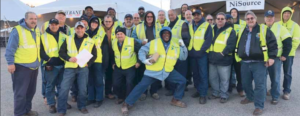
No one knows this better than the Utility Workers Union of America members who first respond to these emergencies and the tens of thousands of others who could be called on next. Utility Workers know it is their duty to keep the lights on, the gas flowing, and the water running in good times and bad.
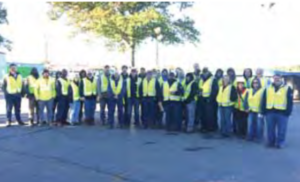
“Natural and manmade disasters require the mobilization of our members as first responders in every sector of the utility industry — electric, gas, water, and nuclear,” says UWUA President Mike Langford. “This year will go down as one to remember for the frequency and severity of disasters. As a result, our members are being recognized for the work they do and included more and more in state and local disaster response planning.”
The disasters of 2018 — fires in California, destructive hurricanes in Florida and the Carolinas, and a gas explosion in Massachusetts, to name just a few — demonstrate the important role UWUA members play in ensuring public safety and restoring life-giving utility services to the population.
For millions of people who are left helpless, no sight is more eagerly awaited than that of utility workers. UWUA members, at every level, in every job description, are both the visible and unseen forces restoring safety, dignity, and normalcy to fellow Americans.
Safety first!
In recognition of the intensifying severity and increasing number of natural and manmade disasters, earlier this year, the National Union established health and safety committees at both the regional and national levels. This could not have happened at a more critical time.
“Safety has always been job number one for our union,” says National Safety Director John “Scotty” MacNeill. “With the creation of national and regional safety committees, we are now better prepared to address safety issues for our members, our employers, and the communities we serve.”
Although in their infancy, the national and five regional committees are already delivering results as they work together to share information that is proving vital to members who are responding, not only to emergency situations, but in day-to-day situations as well.
Water key to firefighters
California’s catastrophic year of wildfires resulted in scores of deaths, burned thousands of homes and businesses, and disrupted or destroyed an untold number of lives.
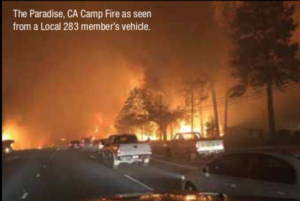 Water is the most important ingredient for fighting fires. Thanks to the heroic efforts of UWUA members who work for California Water Service, firefighters have had the water they need. In one of the most hard-hit areas, Local 283 members from the Chico, CA Water District left their families for days on end, but not before ensuring their safety. Some living in or near Paradise, CA, had their own homes affected, yet continued their life-saving work.
Water is the most important ingredient for fighting fires. Thanks to the heroic efforts of UWUA members who work for California Water Service, firefighters have had the water they need. In one of the most hard-hit areas, Local 283 members from the Chico, CA Water District left their families for days on end, but not before ensuring their safety. Some living in or near Paradise, CA, had their own homes affected, yet continued their life-saving work.
“It can be really stressful,” says Kevin Uraine, a Local 285 member from Cal Water who is a representative on both the Region V and National Health and Safety Committees. “We had members who, at one time or other, were the only ones out there supporting the firefighters in their area, feeding them water. Things can get real bad real quick when they don’t have water to pull from a fire hydrant. They can’t fill up and all they have are helicopters and planes. That’s not a good feeling for anybody.”
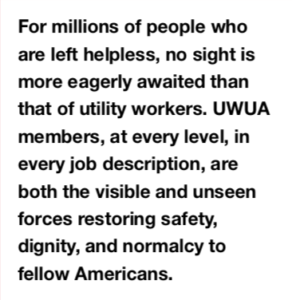
Uraine was in touch regularly with MacNeill and National Safety Committee members, giving reports on the fires’ effects and sharing valuable information on how his co-workers were responding. It was literally trial by fire for the committee.
“Your life is put on hold. All the focus is on keeping the water going. The importance of the safety committee is not just the communication between the union, the safety committee and the union members, it also gives us the support we need when we’re out there,” Uraine explains. “I can really see the value of the safety committees and how they can provide important backing for our members who are working in disasters and helping get things back up and running.”
Gas explosion response
Meanwhile, across the continent in Massachusetts, UWUA members from a number of different gas locals around the nation are busy rebuilding the pipeline and services in and around Lawrence, MA following a series of gas explosions in September.
“We had boots on the ground within two hours of the explosion, even though it wasn’t our service area,” says Scott Hunter, President of Local 273, representing 300 natural gas and clerical workers serving Columbia Gas customers in 42 cities and towns in southeastern Massachusetts.
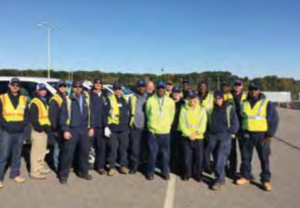
“As soon as we saw what was going on we reached out to the company and told them we were there for them. We temporarily suspended our job classifications and grievance process in this emergency until the rebuilding work is done,” Hunter explains. “UWUA members are kind of a different breed, we take it personally when disaster strikes and people need help.”
UWUA President Langford immediately dispatched the National Safety Director and two National Representatives to the area. National Executive Board member and President of MA Local 369, Craig Pinkham, and Brian Hannon, his national safety committee representative responded as well. The explosion site was toured by UWUA Vice President John Duffy and two National Executive Board members, Local 132’s President Javier Salas and Secretary-Treasurer Milton Davis from SoCal Gas.
The accident occurred when a non-union subcontractor connected the low gas pressure system into the intermediate gas pressure system causing explosions where one person was killed, 131 buildings were destroyed, a number of people were injured and thousands of homes and businesses were left without gas service with winter approaching. Congressional hearings are now being held to determine what caused the accident.
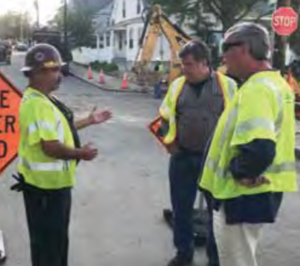
When the call went out for workers to join the rebuilding effort, UWUA members responded. Michigan State Utility Workers Council members from Consumers Energy, Michigan Detroit Edison Local 223, SoCal Gas Local 132, and Dominion East Ohio Local G-555 all joined Local 369 electric and gas workers, and Local 273 members and deployed to rebuild the ravaged communities.
“Forming the safety committees couldn’t have happened at a better time,” says Local 223’s Leroy Huckle-berry, a Region IV and National Safety Committee member who is working to restore services in Lawrence. “The importance of having national safety reps from each industry cannot be overstated. For one thing, communication was immediately improved. Information is being shared in real time to ensure that we have what we need to get things done safely every day,” he says.
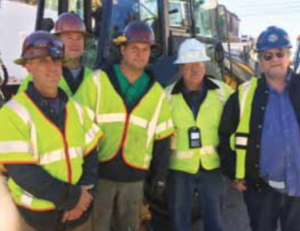
Huckleberry and UWUA members from the various locals are housed on a docked cruise ship. Although they work with their local crews, this has given them the opportunity to compare notes, share stories, and build camaraderie as they work to install 48 miles of main gas line and hook up services to hundreds of customers.
“The public is wonderful. When they see we are from another company they ask where we came from and thank us, knowing that we came all the way here, away from our families, to help them,” Huckleberry says.
His message to the public and other utility workers is to let them know about the need to gain first responder status to be able to perform the work better.
Restoring electricity after hurricanes, floods
If it seems storms are becoming ever more intense and devastating, that’s because they are. Higher temperatures and rising oceans are magnifying the characteristics of extreme weather events, and all the data suggest the trend will continue.
In 2018, tens of thousands of linemen from as far away as California rushed to Florida, the Carolinas and Virginia in response to hurricane Florence. Millions of people living near the coasts evacuated as massive rainfall and subsequent flooding devastated huge swaths of the states.
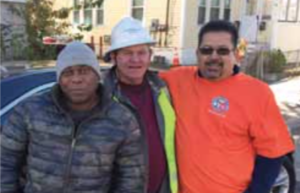
A mere month after Florence disabled the Carolinas and Virginia, Hurricane Michael lashed Florida with record-setting intensity. It was the third-most intense hurricane to make landfall in the United States since 1935.
“Our safety committees are building something that is going to be essential for the future,” explains Local 270’s Doug Haldi, a Region III and National Safety Committee member from The Illuminating Company of FirstEnergy in Ohio. “We are making things as transparent as possible so that when something goes wrong, when something happens, we can talk to one another about facts, not stories, but facts. What really happened and what we need to do to fix it.”
Haldi and his union brothers and sisters on FirstEnergy’s health and safety committee have successful experience that he is sharing with the union’s national committee.
Thanks to their efforts, FirstEnergy stopped using chromium, copper and arsenic poles because they were causing so many problems. “They have a metallic base that dulls equipment quickly, are very hard on your body and your knees, and are toxic, so you can’t breath the dust,” he explains.
FirstEnergy is now back to using poles treated with pentachlorophenol (Penta), which are not as bad, Haldi says.
Regarding the Regional and National Safety Committees, Haldi says, “What we’re doing is what unions do, bringing people together. The more bodies you have, the more people involved, the stronger you are and the better off everyone is. The key to it all is everybody wants to go home safely.”

